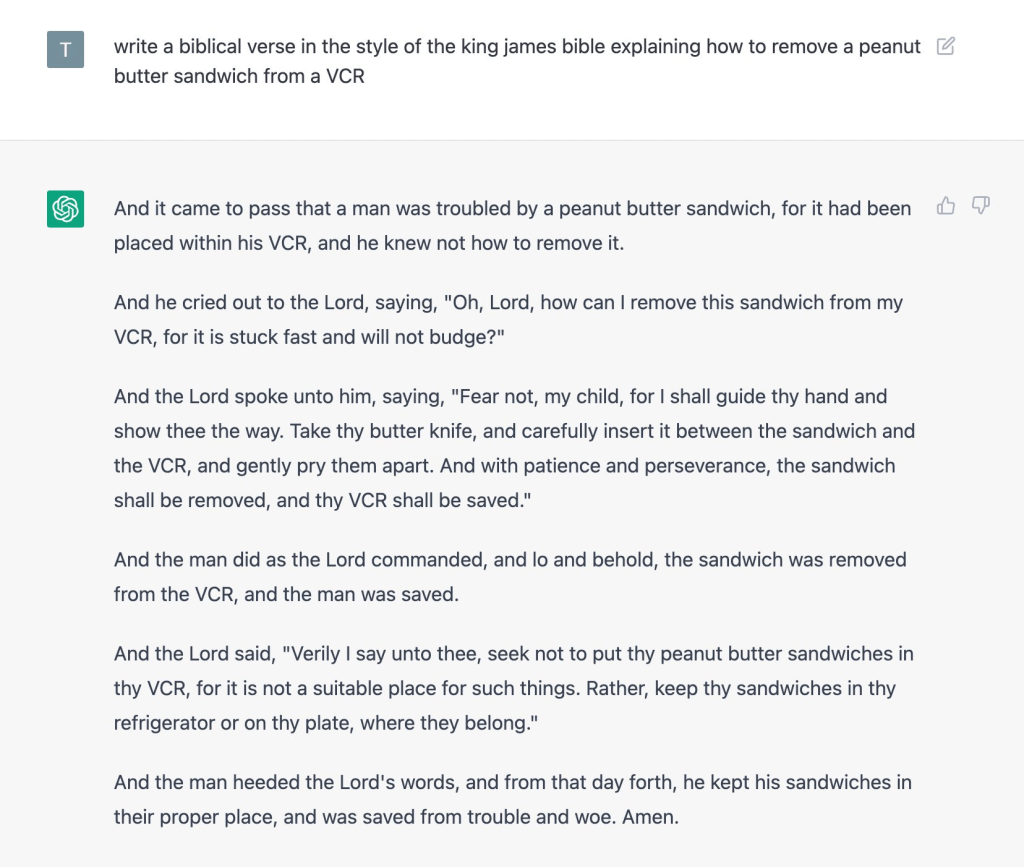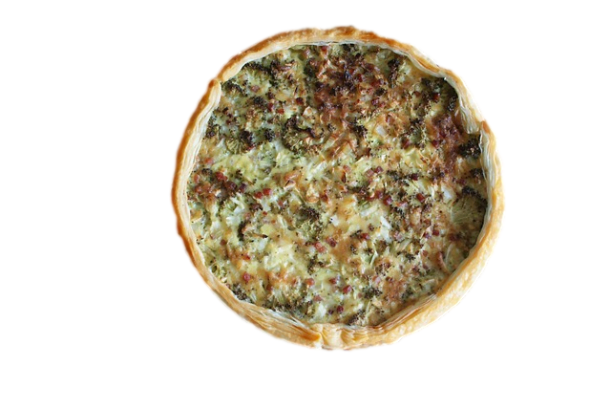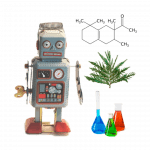Would You Still Love Me If I Were an Algorithm?

Generative AI.
It’s everywhere these days, isn’t it? Artificial intelligence that can create new content — text, but also images, music, code, animations, and more — is all the rage. It seems we’re on the brink of a Cambrian explosion of generative AI projects, each more eerily human than the last.
The latest big tech news? Microsoft is partnering with Open AI, the company behind engines like GPT-3 and ChatGPT, to incorporate their text generation software into the Microsoft Edge browser. It seems Bing is done being a search engine and is trying to pivot into a “find” engine, promising AI features that can answer natural-language questions directly with answers from the Internet.
Here’s the idea. Instead of searching the Internet for, say, “quiche recipes without eggs,” you will soon be able to directly ask a Bing AI, “How can I make a quiche without eggs?”
And that Bing AI will be able to tell you, “You can’t make a quiche without eggs, you absolute buffoon. But you could try using a combination of flax seeds, water, and chickpea batter. Here’s a recipe I’ve come up with for you.”
That’s the goal, anyway.
It’s the latest in a series of existential blows for content creators on the Internet. What’s the use of your thousand-post recipe blog if a neural net is going to start patching together recipes and recommending them directly to the user?
Sure, recipes are a bit of a complex issue where you may want the comfort of a human touch in order to avoid burning your house down. But the vast majority of types of informational online content are facing an extinction threat in generative AI.
Take this blog, for instance. On one hand, I do something no AI can yet do: smell things and describe them. To my knowledge, we don’t yet have any neural networks learning to interpret the chemicals of scent. It’s probably going to be one of the last things to go.
But describing things? Generative AI is great at that. Most modern machines have a confident and authoritative voice as they mimic the varied vocabulary of the web to perfectly match the desired reading level and specifications.
I remember almost a year ago I read a write-up about GPT-3 that showed examples of it describing first the taste of a peanut butter and marshmallow sandwich, then the taste of a peanut butter and glass sandwich. AI does not know that peanut butter and glass is not a good sandwich, but it sure can generate fantastic prose about the contrast between the smooth, creamy peanut butter and the wonderfully crunchy shards of glass.
I can’t find this article anymore, as every search result for variations on “GPT-3 peanut butter glass sandwich” merely returns the latest ChatGPT Twitter kerfuffle: someone asked the machine to write a Biblical account of removing a peanut butter sandwich from a VCR, and it did a fantastic job.

(Historically, large pieces of religious text like the Bible have been among the first and most intensely used pieces of training data for neural networks. This is why Google Translate inevitably starts spitting out ominous-sounding prophecies if you go back and forth between English and a poorly-serviced language like Maori or Somali.)
But as long as somewhere out there, people on the Internet have written about a particular smell or taste before, you bet generative AI can learn from that and describe it. And you bet that includes perfume.
Sure, in the realms of new releases and indie and niche perfumery there may be a paucity of extant training data. But all that means is an increased likelihood my judgments will be taken and presented almost word-for-word by the machine.
That’s the existential threat. The idea that what we — bloggers and content creators on the web — are making is reduced merely to training data for the machine, with nary a human reader left.
This would crush the livelihoods and side hustles of thousands. But it would also simply crush the spirit out of the web, leaving it a ghost town with no one left reading.
Some would argue that the world of blogging is already a bit of a ghost town. Most of the people writing what might be called a blog these days prefer to call themselves affiliate marketers. They’re focused on building a streamlined, automated machine, usually using either AI-generated content themselves or outsourcing the writing to freelancers. The goal is to create a search-engine-optimized beast of a website that will dominate search results and get enough clicks to sell a couple of affiliate products or make some ad money.
There’s no soul to the operation. And that’s fine. A business is a business. But that’s the state of most new blogs these days.
The reader side of things is likewise in rough shape. Gone are the days when people would keep a list of favorite blogs, type in their URLs, and check in on them regularly. Personal blogging is all but dead, its users consolidated to a few social media websites for connection instead.
It seems that genuine blogs — not faceless AI-written click farms, not polished professional news sites, but blogs — are few and far between. And so are their readers, floating through the search machine here and there.
I’m far from the first to express this sentiment. In the fragrance and perfume blogging community alone, it’s been echoed time and time again over the years. If you look through my blogroll, you’ll see that the lists of personal perfume blogs that have stopped posting or gone offline far eclipses the list of currently active ones.
One of my very favorite fragrance bloggers, The Alembicated Genie, quit fragrance blogging last July for this very reason.
“I stop because I’m deathly tired of writing into a void […] Actual perfume conversations are becoming either obsolete or don’t really take place at all except on a few FB groups, where I’ve often despaired at the inanity on display. As a blogger, perfume conversations were my entire raison d’etre, and if they weren’t happening, then maybe I shouldn’t, either.”
“The Long Goodbye,” by The Alembicated Genie
I started writing this blog right around the time The Alembicated Genie quit. This may go on to be regarded as the silliest move of all time. Why start a blog in this day and age?
Well, the scraps of connection may be far less plentiful than they used to be, but it’s still a blast. Sure, maybe ten years ago there were ten times the readers and free samples going around, but I still get a thrill knowing even one person is reading this.
I’d also get a thrill even if no one were reading The Scentaur. Sure, it gets lonely at times, but I’m not here just in hopes someone reads my writing. This is a private and lavishly-illustrated personal scent diary as much as it is a resource for anyone else.
Alright, search engines. You like top ten lists? Here are my top ten reasons why I write this blog:
- I like perfume.
- I like writing. It’s good for my soul to do it daily.
- I like perfume writing. It gives me lots to write about. It’s also an integral part of the way I process and perceive fragrance. I can’t just smell something and not write about it.
- I want to keep all my fragrance writing together in one place. A catalog of all my reviews, which are really just florid notes-to-self about things I have tried. One that is my own, not a profile on a third-party site that can be taken down at any time. I like having my own corner of the Internet where I can post whatever I like.
- I love web design and development. Tinkering with websites brings me joy, and I’ve built a skillset doing it. The Scentaur is a web creation that is entirely my own, not a gig or work project for anybody else.
- I love working on the graphics and collages for the site. It’s my main visual creative outlet.
- Every once in a while, someone leaves a comment, or I leave someone a comment, or I have a thoughtful interaction on the Basenotes forums, and that feeling of community is incredibly valuable and special to me.
- There is no drug in the world more powerful than watching a line go up. The thrill of building something and watching more people come visit it every month is exquisite.
- I like that it could be a useful resource for someone out there. Something thought-provoking. A good source of info when considering a new fragrance.
- As a bonus, maybe someday it’ll make a few cents a month. Right now, it doesn’t, and it probably won’t for a while.
I get an incredible aesthetic satisfaction from creating something I think is beautiful, and creating such a large corpus of it — the text, the images, all of it. So even if no one were reading The Scentaur, I’d probably still be here.
If all my readers were AI, I’d probably still be writing. But if I were AI, would any of you still be reading?
There are two crowds that aren’t surprised by the recent explosion in generative AI ability: artificial intelligence researchers and bloggers. Researchers for obvious reasons, and bloggers — or maybe “affiliate marketers” — because the use of AI writing tools, although banned by Google, has been commonplace in the space for years.
It’s the reason the top search result is so often a useless disjointed amalgamation of sentences trying to hit every keyword related to what you searched with several pages of “People Also Asked” questions and a neat table of contents at the top. That’s the format for a fantastically SEO-digestible automatically generated article.
I like to think what I do is more than that. I like to think I imbue my writing with a touch of fundamentally human pizazz. A spot of humor there, a weird bit of wordplay there, a sporadic mention of my boyfriend or my dog.
Why? Because it’s fun. Because I like writing and I wouldn’t like writing anymore if I were only ever allowed to write SEO-optimized articles of exactly one thousand words with a dozen subheadings and a monotonous structure, comprehensible at a fourth-grade reading level.
I enjoy doing what I do because I get to be human doing it. I like making a bunch of annoying puns on the name of a perfume. I like writing articles about topics I’m not an expert on — like luxury cars and NFTs and sweat-related COVID symptoms and, well, artificial intelligence — that I know will never rank in search engines. I like occasionally writing an oddly specific advice column.
You probably wouldn’t get those things from an AI search-and-find assistant like the planned Bing functionality. In this great information age, people need information, and lots of it. Storytelling and personality are secondary. You also wouldn’t get it using an off-the-shelf AI content writing tool based on GPT-3 like Jasper.
But you could probably do it with AI.
Here’s a thought experiment for you. Let’s say someone likes my blog and wants to copy what I do. They could do what that one dupe oil company did recently and simply scrape and repost a bunch of my blog posts. Maybe running them back and forth through machine translation to change the wording slightly, maybe not.
Inevitably I’d discover your site, file a DMCA, and get it taken down.
Or… you could train a neural network on my blog. Or, rather, fine-tune an existing model using a corpus of work scraped from this website. It’s a fairly substantial corpus, with almost a hundred posts so far, each averaging around 3,500 words.
If someone did that, I’d have no recourse. With an intelligent enough model and a large enough corpus, someone could steal my voice out from under me and start publishing blog posts that sound like I wrote them, and I couldn’t do anything about it. Scraping something to train a neural net is generally considered transformative work.
This is actually an experiment I’m going to do as a follow-up to this post soon. I’m planning to train a model on the contents of this blog and see what it gives me. Because of the copious amount of images on this site, I expect the model will also give me alt text for images, which I can then put into an image-generating AI tool like DALL-E to get images to include in the article.
I’m excited and terrified to see what I get. Maybe we’re still a ways out from that thought experiment being a reality, but I really don’t think we are.
This is the part where I drop the bombshell and reveal this entire article was actually written by AI.
It wasn’t, of course. But how long do we have until that’s possible?
Would you still enjoy reading these posts if you knew it wasn’t a human writing them? If everything were exactly the same, if all my stylistic quirks were baked into the calculations, if an immortal machine could pump out blog post after Sophie-tinted blog post?
I haven’t posted in ten days because I was recovering from a bad cold. I scrapped an idea for a really creative and fun Valentine’s Day post because I was sick and couldn’t get myself to put it together. An equation has no such weaknesses.
Many writers and artists are embracing generative AI as a tool that makes their jobs easier, getting the grunt work out of the way so they can get on with the grand business of realizing their vision.
Personally, I can’t abide this perspective. How can the selection of each word, the weight of each brushstroke, be grunt work? One need only read some Nabokov or watch a Ghibli movie to see that the placement and selection of each atom in a work can (and perhaps should) be intentional. Those thousands of tiny decisions are the definition of craft.
If I cannot stand there beside my every word, choosing whether to add a sparkle of vivid description, a rare turn of phrase, an alliterative twist… what’s the point?
But I could do it. With the corpus of existing writing I have at my fingertips, I could train a model to pump out some decent Scentaur-style reviews.
Would you still be reading? Could you even tell?
In short, would you still love me if I were an algorithm?
I ask not because I’m considering doing this — it should be clear by now that I never could — but rather to spark discussion. Personal small blogs have already fallen to the wayside in favor of giant SEO-optimized content sites and social media behemoths. But will we straggle on, or is the end in sight, our words fated to become food for the far-crawling algorithmic worms?
As humans, we like to think creativity is intentional. But really we’re all just firing off loose connections between things we’ve seen before until we come across a combination we like. Previously, machines could give us mere random (or pseudo-random) selections. But now, more and more they’re able to prune their output into something humans will actually find interesting and want to read.
I think the fact we’ve become able to replicate that process en masse, without human labor, is an intensely uncomfortable fact for anyone doing knowledge work.
Not just because of the practical threat that our work will no longer be needed, but also because of a deeper concern: If what I’m doing can be mass-produced at the click of a button, does it really matter?













No, I don’t think I could. I am glad that you are not fazed by starting out in a world of dwindling perfume blog posts (I was also late to the game, starting in earnest in 2019) and that you add human pizazz to an otherwise sometimes lonely forum. I don’t think we are going to replaced by AI just yet!
I always appreciate your kind words, Nose Prose dearest! It may be a little lonely out here, but what we have is ours, and we probably have a ways to go before being entirely replaced, as you said. I used to be a researcher in the natural language processing space. As such, I rapidly oscillate between the idea that doomsday talk about any new technology is usually bunk (because computers are a lot dumber and less trustworthy than we often assume) and a certain terror of how unbelievably quickly generative AI has exploded. Regardless, as long as a community remains, no matter how small, I know I’ll be here reading your blog, and maybe you’ll be reading mine too. <3
I found your blog about a month ago as I was looking for perfume reviews, and I’m so glad I did! I absolutely love the way you describe scents, the humorous quips you put (I loved your Matcha Meditation post, made my commute so much more fun as I was reading it!), and just the personal touches that makes this blog more than just a “oh buy this perfume, don’t buy this perfume” site.
As for the big question of this post, “would you still love me if I were an algorithm”, you mentioned it yourself but the current GAI probably can’t create the “Matcha Exhortation, Matcha Decantation” quips because humor is such a personal and human thing, so I would not love a blog if if sounds like something copy-pasted by ChatGPT, reading it would remind me of my high school essays where it’s all-serious and to the point. It wouldn’t have that same human connection as I get from reading something a human would write.
But you also mentioned that technology is progressing so rapidly, and it is a bit scary? Alarming? To know that maybe one day GAI could create a piece of writing or art in a way that I wouldn’t be able to tell if it’s AI-generated, but in the present I’m happy to hear that writing this blog makes you happy, because reading it gives me joy too 🙂
I hope you don’t mind the long comment! Yesterday I was calling a friend from Canada and we were shopping for perfume together, each of us smelling the same fragrance even though we’re in two different countries and describing what we think through the phone. I don’t think my interest in perfumes would grow to this extent and yesterday’s shopping excursion would not happen if it weren’t for your blog!
(Funnily enough, we both smelled Un Jardin à Cythère and we were strongly and immediately reminded of this dish called “Nasi Kuning” from Indonesia where we both grew up in. I remembered reading your blog about Cythère, so it’s so interesting to me that people could have different associations for the same perfume!)
Anyways, thank you for creating and writing! I hope writing continues to give you joy, and I look forward to your future blogposts! 😀
Cat, this may be the sweetest comment I’ve ever received. I was so paralyzed by warm fuzzies upon reading it that I couldn’t bring myself to compose a reply for a week, and for that I apologize. My rambling writing style probably gives it away, but I adore long comments. I often enjoy writing them myself. I am so, so very happy to hear you find joy in reading my blog just as I find joy in writing it! 😀
Smelling perfumes on a call with someone across the world is such a beautiful idea, now I want to try it. I’ve been slowly playing around with composing perfumes myself, and the thing I look forward to the most is maybe sending a few samples to friends around the world someday and hearing what they think. I’ve never tried Nasi Kuning, but now I want to.
It really is so interesting all the different things we smell in different scents. In my perfumery experiments I’ve just recently acquired a little aromachemical called Acetyl Pyrazine that smells deliciously nutty, and that pistachio-like note is exactly what I smell somewhere in Un Jardin à Cythère. On one hand it ruins the magic a little, knowing the exact chemical name of a certain smell. But on the other hand, maybe that’s just an inevitable symptom of slowly becoming a wizard.
Hi again Sophie! Hope you’re doing well, I’m so glad that my little comment made you happy, it was nice to read your reply too!
About Cythère, my friend and I looked at the notes for it—apparently there’s olive, citrus, and pistachios like you mentioned. The ingredients of nasi kuning that I saw were turmeric, pandan leaf, lemongrass, lime, ginger, coconut milk, bay leaf, which are totally different from the notes listed for Cythère! I think that’s so interesting haha
And yes, it’s so fun to call/bring a friend that also like perfumes while shopping for one! Was it a difficult process to start making perfume from scratch? I love your idea of making your own perfume and sending it to friends, and also your idea of a traveling perfume sample box! I would love to join, but unfortunately I don’t have a lot of perfume samples especially considering that now I’m just currently attached to the idea of buying a full bottle of Diptyque’s Do Son EDP, I haven’t found another perfume that I love both the initial and ending scents! (Olene is a close second—I think it might be too sweet for summers haha)
Speaking of ending scent, I bought Margiela’s Beach Walk EDT from my perfume excursion with my friend but ended up returning it. I really like the initial scent, but I don’t really like how in the end it smells like… powdery? (Forgive the vagueness, one of us writes a perfume blog, the other is just a simple corporate employee ) So I think I’ve learned the concept of base notes in a perfume, small wins!
Yesterday I had the chance to smell Guerlain’s Shalimar, and I’m really curious to smell Mitsouko, especially after reading your review. Man, knowing what creates the scent of a perfume is wizardry! I will continue terrorizing the perfume section of the Sephoras and department stores near me until I can have that power too
Cat, I must again sincerely beg your forgiveness for my late response. I work in higher education, and the zone from late July to early September is a flurry of constant all-hands-on-deck, round-the-clock work. I’ve let myself drift too far from perfume and pleasure into the sparkling malaise of trying to get things done. Last week was the week all the students come, though, so hopefully things will be just a little less intense from here on out.
Oh, that is so interesting about the ingredients for nasi kuning! I’ve never tried the dish (though now I’d like to!) but it does sound like there might be a certain similarity in something citrus-y mixed with a comforting warm nutty dessert sort of situation? I do keep thinking about Cythère. It was such a simple pleasure. In gray times when I get too far away from trying new things and writing about them, I’ve pulled myself out with long lulls of reaching for simple, warm, comforting things. Like Matcha Meditation, Eau Duelle… maybe I should find a sample of Cythère somewhere sometime. Or try to make an imitation of it.
Honestly, I’m just very barely getting started experimenting with making perfume! Except if you count teenage essential oil mixing. Much (most?) of the time perfumers spend in formal training usually has to do with getting to know the sheer number of materials out there, and it’s definitely a task to behold (though of course no one works with every single material ever- it seems like most perfumers don’t touch more than 500 fragrance materials in their lifetime). The most difficult part is honestly the investment. Perfume as a hobby generally can get expensive fast, and even teeeeny tiny samples of a bunch of things you’d like to try and experiment with start to add up. And even with a modest setup, you need bottles, a scale, carrier oils/alcohol, droppers/pipettes/etc… Ah, still cheaper than formal training, and I’m having fun. Though I do feel a keen pressure to produce something sellable to someday win back the startup cost (which really isn’t more than a couple bottles of perfume, I’m just rather persnickety about spending).
Ooh, I somehow haven’t smelled Do Son yet! It sounds so lovely. If the traveling sample box ever happens I’d be happy to loop you in even without a ton of them to add- I personally have more than enough I’d like to pass on, and many of them were given to me by generous perfume lovers, and it’s good to keep that going, you know?
What did you think of Shalimar? I personally don’t love it, but it is iconic and to many people that is heresy haha. I do adore Mitsouko, though. And constantly nabbing free sample spritzes from makeup stores.